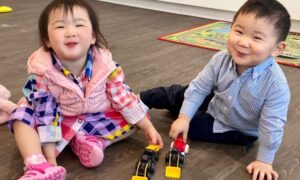Artificial intelligence, clever robots, and computer automation have already become key features of the human experience. The products we enjoy, the social media services we use and the websites we view are not only heavily curated by intelligent algorithms but they are often created by them, too. As the world becomes more integrated with technology we continue to look for solutions to age old issues in innovative ways.
One of the original tasks humans have always had to bear is the duty of taking care of children and babies. You don’t have to be a nanny for long to realize how demanding the work can be. It seems like children are always on the move, looking for something to eat, getting hurt and getting into things they shouldn’t. They need constant guidance and protection from danger. Having robots take care of children could be a revolutionary advancement in this area – and could also pose some intimidating risks.
Childcare Is Expensive
Paying for childcare services is one of the largest costs that most working adults regularly have to navigate. Even well-behaved kids need close supervision to ensure that they’re being safe and they have their needs met. According to Statista, childcare costs as much as 25% of a household’s shared net income per year. One of the main reasons paying for childcare is so expensive is that unlike paying for a product to be manufactured, childcare requires human work hours – the most expensive kind of hours. Furthermore, daycares often have to keep their doors open for many hours in the day and they require lots of supplies such as kids toys to adequately take care of the kids.
Several promising robots and technologies compete to be the first to serve childcare services on a wide scale. If one of these technologies could take the place of human babysitters, daycare centers could cut their costs considerably and forego hiring expensive assistants and nannies and reduce the price for parents. With adeptly customized robots doing the job instead of expensive humans, many hard working adults might be able to work less in a day and have more time and money to spend with their little ones.
People Are Relying On Daycares More And More
For many of us who grew at home under our parents’ roof and with the constant watchful eye of a caring mother or father, we might feel repulsed by the idea of a robot in the home taking care of the children. Although many people may have these feelings towards outsourcing domestic childcare, the childcare industry at large (which is not run by parents anyway) may be a more practical and cost efficient place for robots to help out. Year after year daycare demand across the globe has grown considerably as more adults look for a place in modern workforces. These trends will likely not reverse any time soon. As we continue to dedicate money, effort and thought into taking care of kids while parents work, it’s easy to imagine how there will be renewed urgency to lower the cost of daycare while safely and lovingly tending to children. We can anticipate that large investments will go to work seeking to automate and facilitate daycare processes.
AI and Robots Are Getting smarter
As previously discussed, many team and organizations are jockeying to revolutionize the childcare space. These changes and developments could be just around the corner. However, once we have finished asking the question of “can we?” we should stop to thoroughly discuss “should we?”
As discovered in Harlow’s famous experiments where baby monkeys had the choice to choose fake mother monkeys for the food they could provide, or the warm fur that other fake mothers could provide, the monkeys invariably chose the soft and comforting mothers over their counterparts. While physical warmth was a big element of this occurrence, it seems apparent that the emotional bond between two warm blooded beings was the underlying current at work. With our own children, we will probably never be able to substitute robots’ care (no matter how humanlike) for the indispensable human qualities that actual caregivers afford. This kind of loving care is an important part of successful child development.
The question is, are we comfortable with outsourcing some of the more demanding aspects of it in order to cut childcare costs and inconveniences? Or is natural parenting and human care even more important than we even now recognize? Only time will tell.



































